 Petzlover
Petzlover Chesapeake Bay Retriever is originated from United States but Grand Griffon Vendeen is originated from France. Chesapeake Bay Retriever may grow 21 cm / 9 inches higher than Grand Griffon Vendeen. Chesapeake Bay Retriever may weigh 25 kg / 56 pounds more than Grand Griffon Vendeen. Both Chesapeake Bay Retriever and Grand Griffon Vendeen has almost same life span. Both Chesapeake Bay Retriever and Grand Griffon Vendeen has same litter size. Chesapeake Bay Retriever requires Low Maintenance. But Grand Griffon Vendeen requires Moderate Maintenance
Chesapeake Bay Retriever is originated from United States but Grand Griffon Vendeen is originated from France. Chesapeake Bay Retriever may grow 21 cm / 9 inches higher than Grand Griffon Vendeen. Chesapeake Bay Retriever may weigh 25 kg / 56 pounds more than Grand Griffon Vendeen. Both Chesapeake Bay Retriever and Grand Griffon Vendeen has almost same life span. Both Chesapeake Bay Retriever and Grand Griffon Vendeen has same litter size. Chesapeake Bay Retriever requires Low Maintenance. But Grand Griffon Vendeen requires Moderate Maintenance
 Fondly referred to as the Chessie, the ‘Labrador-look-alike’ Chesapeake Bay Retriever’s history extends to St. Johns Newfoundland pups which were rescued off a ship off the coast of Maryland in 1807. The Chesapeake is an American breed.
Fondly referred to as the Chessie, the ‘Labrador-look-alike’ Chesapeake Bay Retriever’s history extends to St. Johns Newfoundland pups which were rescued off a ship off the coast of Maryland in 1807. The Chesapeake is an American breed.
It is believed that the Newfoundland puppies as they grew, were bred with area dogs, with there being few records of the early dogs, but it is believed that spaniels and dogs were included.
In 1918 the Chesapeake Bay Retriever was recognized by the American Kennel Club and in 1964 the dog was declared the official dog of Maryland.
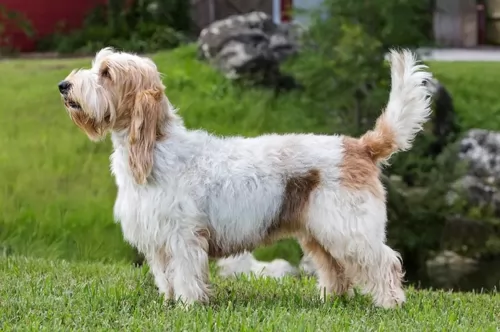 The Grand Basset Griffon Vendeen is a French scenthound that has changed over many centuries. Today the area in France where they originate from, has contributed to the dog's looks.
The Grand Basset Griffon Vendeen is a French scenthound that has changed over many centuries. Today the area in France where they originate from, has contributed to the dog's looks.
The rocky and thorny region of Vendeé required a hardy breed of dog. Also, hunters wanted a slower hound that they could keep up with and the idea was to shorten the legs of the dog.
By the end of the 19th century, the Basset Griffon Vendéen was developed. By the 1950s, the Grand was considered a separate breed.Today the dog is a long-backed and short-legged hunting dog.
 The Chesapeake is a large dog belonging to the Sporting breed group. Perhaps one of the more distinctive features of the Chesapeake Bay Retriever is the yellowish eyes.
The Chesapeake is a large dog belonging to the Sporting breed group. Perhaps one of the more distinctive features of the Chesapeake Bay Retriever is the yellowish eyes.
This is a strong, well muscled dog that stands anywhere from 61 – 66cm and weighs between 30 – 45kg. The short, thick coat of the dog is waterproof and comes in colors ranging from brown to reddish yellow to chestnut shades.
The head of the Chesapeake is broad and roundish with medium length floppy ears. The tail is long. The toes are webbed which helps makes the dog an excellent swimmer as well.
The Chesapeake Bay Retriever is a happy kind of dog with a bright, alert, intelligent expression. He loves water and is guaranteed to make a wonderful pet for any family.
With his wonderful characteristics, it is worth training him and socializing him as this training sets parameters for him so that he becomes a wonderfully obedient dog that gets on well with other pets in the home as well as with children.
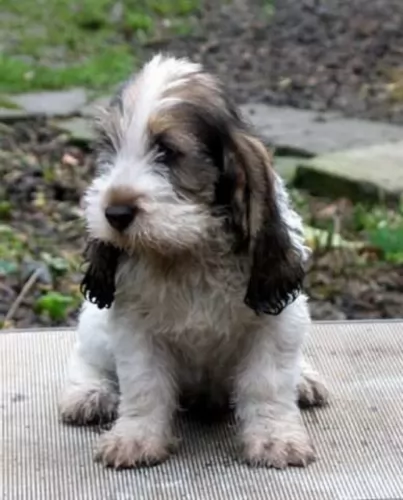 Kept today essentially as a domestic pet, the Grand Basset Griffon Vendéen is a strongly built dog, a rough-coated scent hound of medium size standing at roughly 39 to 45cm in height and weighing 18 to 20kg.
Kept today essentially as a domestic pet, the Grand Basset Griffon Vendéen is a strongly built dog, a rough-coated scent hound of medium size standing at roughly 39 to 45cm in height and weighing 18 to 20kg.
The coat is medium length, shaggy and wiry. It is essentially white with orange markings. Sometimes he can be tri-colored, having a combination of orange, black or tan markings. The double coat is actually regarded as his defining characteristic, being shaggy with a wiry texture that sets him apart from other hound breeds.
His legs are straight, and he is longer than he is tall. He is a deep chested dog with long ears and a long tail. He is also noted for his mustache and beard with long eyebrows.
Your Grand Basset is a courageous, happy, confident dog. He is active and has great stamina. As a social, pack dog, he likes plenty of time spent with his owner, failing which the owner should invest in another dog too so as to be part of a pack. He will get on great with children and he is also a pet-friendly breed who will get on well with cats too. He is sharp and alert and responds well to training and socialization.
 The Chesapeake Bay Retriever is ready to be your best friend and companion. This dog breed is highly active and he’ll fit easily into a family that is active and can ensure he is involved in all their activities.
The Chesapeake Bay Retriever is ready to be your best friend and companion. This dog breed is highly active and he’ll fit easily into a family that is active and can ensure he is involved in all their activities.
The beauty about the Chesapeake Bay Retriever is that he is generally an even tempered dog, and once trained and socialized, becomes a truly splendid pet, one that will be loving and loyal with his owners.
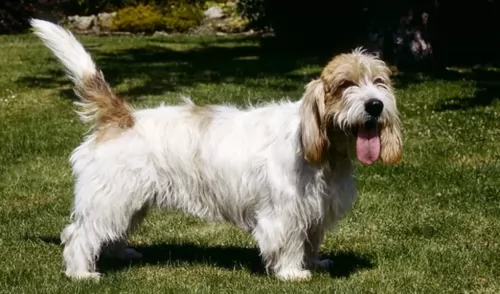 This long-backed, short legged hunting dog has a happy, confident personality. While he was used originally for hunting, he is now commonly kept as a companion.
This long-backed, short legged hunting dog has a happy, confident personality. While he was used originally for hunting, he is now commonly kept as a companion.
He is energetic and independent and will require you having him join you for walks and a ball game too.
Non-aggressive and adaptable he can live in the city or in the countryside so long as he receives plenty of attention and love – then he'll be a splendid pet.
 By taking good care of your Chesapeake, you can ensure his teeth remain strong, his nose is wet and his coat glossy and healthy. He is a robust breed as it is, but there are always some common dog diseases to watch out for -
By taking good care of your Chesapeake, you can ensure his teeth remain strong, his nose is wet and his coat glossy and healthy. He is a robust breed as it is, but there are always some common dog diseases to watch out for -
Obesity is an ailment that is afflicting many humans and their pets. Being overweight can bring on a host of unwanted diseases. Obesity is a serious disease that can contribute to digestive disorders, back pain, heart disease and joint problems.
Instead of showering him with little treats to show him how much you love him, rather stroke him or play a game with him – it’s the ultimate treat for him – your attention.
Remember that if you aren’t going to let your Chessie become a parent, the best thing you can do for your male or female is to have them spayed or neutered. In fact, spaying or neutering can decrease the likelihood of your pet getting certain types of cancers as well as other illnesses. Speak to your vet and discover how these procedures can be very beneficial for your pet.
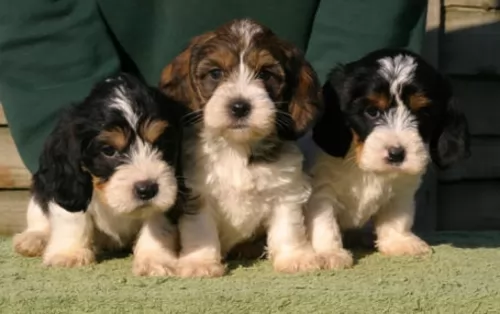 There are some Basset Griffon Vendéens that have reached 17 years of age. This is excellent for these dogs, and lifestyle, nutrition and exercise can all play a part in the longevity of any dog. While he is a pretty robust canine, you'll want to be aware of some of the diseases which may require veterinary intervention.
There are some Basset Griffon Vendéens that have reached 17 years of age. This is excellent for these dogs, and lifestyle, nutrition and exercise can all play a part in the longevity of any dog. While he is a pretty robust canine, you'll want to be aware of some of the diseases which may require veterinary intervention.
Cancer is a major cause of death in elderly dogs, but if caught early, the dog can be cured. These cancers can be malignant lymphoma, skin cancer, bone cancer or soft tissue sarcomas. You'll notice a lump on your pet or a wound that won't heal. When you notice your dog not feeling well, get him to the vet.
Common forms of heart disease in dogs is valvular disease, heart-worm disease and myocardial disease. The signs of heart disease in your pet will depend on the severity of the disease and type.
As heart disease moves on to congestive heart failure, you'll notice symptoms such as difficulty with breathing, fatigue, loss of appetite and weight loss. You need to get your dog immediately to the vet.
Dog allergies can be caused by pollen, medications, food or insects. Your pet will be scratching, he'll have watery eyes and inflamed skin. This inflammatory condition can cause a lot of agony for your pet, driving him mad with the itch and pain. Relieve his discomfort by getting him to the vet as soon as possible.
 The Chesapeake Bay Retriever sheds fairly heavily throughout the year. The coat should be brushed at least twice a week to remove dead hair. Brushing is good for the dog too as it distributes the oils of the skin, making his coat shinier.
The Chesapeake Bay Retriever sheds fairly heavily throughout the year. The coat should be brushed at least twice a week to remove dead hair. Brushing is good for the dog too as it distributes the oils of the skin, making his coat shinier.
Because the Chesapeake has floppy ears, the ears will need to be checked on a weekly basis for signs of infection. This is of particular importance if your Chessie loves to spend time splashing around in water. The veterinarian can recommend and also advise on cleaners for your dog’s ears.
An excellent diet and plenty of exercise will ensure your Chessie can live to be 11, 12 or 13 years of age. You want to keep his diet of kibble, rice, vegetables and meat consistent so as not to upset his stomach.
Avoid giving him foods such as chocolates. Do research on the harm you can do to your pet when you feed him some human foods that are entirely not meant for a dog’s digestive system.
The Chesapeake Bay Retriever has always loved to be active - hunting for- and retrieving birds from rivers and lakes. He is used to being active and will require a good supply of exercise. Take him for long walks and let him join you on your runs or your cycling.
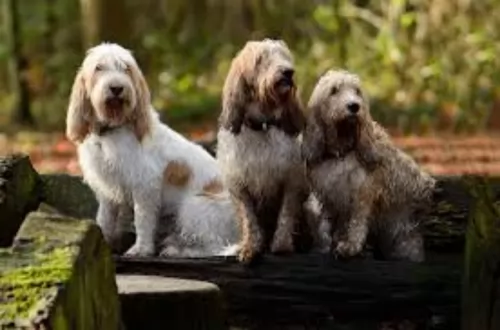 If you are going to be feeding your Grand Basset Griffon Vendéen kibble, there are manufacturers who bring out excellent foods which are breed-specific formulas for age, size and energy levels of dogs.
If you are going to be feeding your Grand Basset Griffon Vendéen kibble, there are manufacturers who bring out excellent foods which are breed-specific formulas for age, size and energy levels of dogs.
Feeding a dog is an individual choice, but good food can increase his longevity. A bit of raw meat mixed into his kibble, or some cooked brown rice, vegetables and chicken will be excellent for him and can add some tasty variety to his diet.
Fresh, cool water must always be available at all times.
The Grand Basset Griffon Vendeen’s coat is double and the rough, harsh coat will need brushing twice a week and stripped once a year.